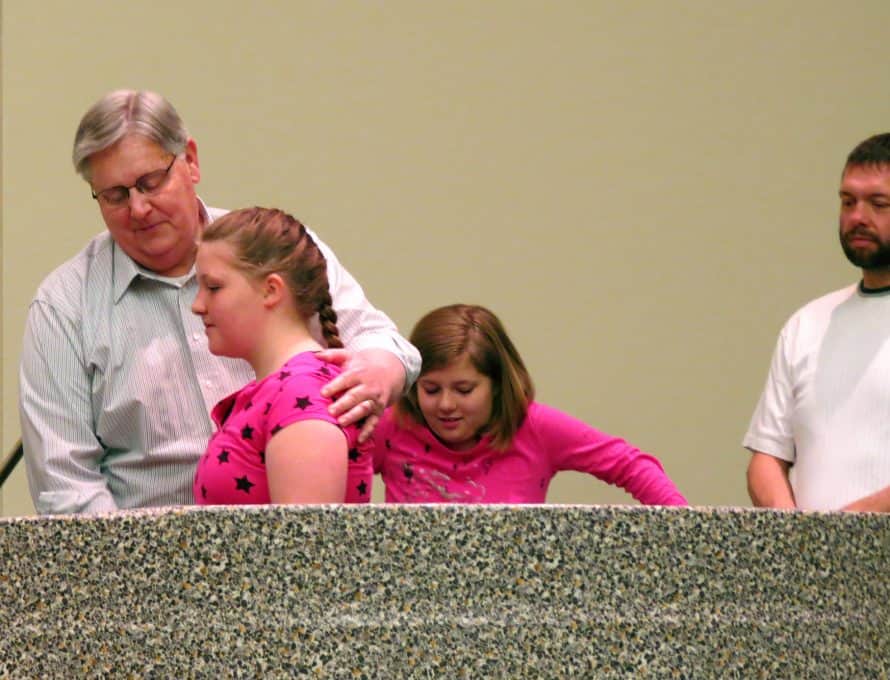MONROE, Mich. (BP) – Churches, such as Heritage Baptist Church, talk frequently about the eternal difference the Cooperative Program makes in the lives of individuals worldwide.
CP fuels a national pastor in Uganda – who first heard of God’s love from an International Mission Board missionary – as he travels from village to village, spreading God’s story. CP fuels the North American Mission Board church planter in Massachusetts who tells a 12-year-old boy who has never heard the name Jesus about the love God has for him. CP fuels the desire of the church member in Utah — discipled at an Oregon church — to join a mission trip to Mexico to build homes for people who were living in cardboard shacks. CP, founded in 1925, is the Southern Baptist Convention’s unified giving channel that supports the convention’s missions and ministry.
“We’re trying to advance God’s Kingdom,” Bob Wood, pastor of Heritage Baptist Church in Monroe, Mich. told Baptist Press. He noted the church’s youth group was going this summer to the Chicago area on its first mission trip.
“The proof is in the pudding,” he said. “We give to missions through CP not for what we get out of it but because it advances the Gospel in the United States and around the world. The blessing comes from being obedient to the Great Commission responsibility we have to make disciples. CP is the most effective way of doing that worldwide.”
Because Heritage Baptist gives 15 percent of undesignated income to missions through the Cooperative Program, the church is free from the burden of figuring out which missionary to support, Wood said. Instead, the Cooperative Program lets the church give to thousands of national and international Southern Baptist missionaries through one fund.
“The Cooperative Program has allowed us to provide many more missionaries than do other evangelical denominations’ programs. They have limits as to what they can do because of the way they do their funding,” Wood said. “[CP is] the most effective way to fund missions around the world.”
Having met first in a school building and later in another church since its 2008 founding, Heritage Baptist Church constructed its first sanctuary in April.
The 13,800 square-foot facility seats 330 for worship, has six classrooms and office space on a 20-acre parcel in a rapidly-expanding area about five miles west of downtown Monroe, surrounded by farmland and new homes. About 150 people attend Sunday worship services.
“Part of being a Southern Baptist church is giving to missions through the Cooperative Program,” Wood said. “We have taken opportunities from the pulpit and in group meetings to [teach how CP] works. It’s a good reminder for longtime folks and it’s an education for those who are new to Southern Baptist life.”
Woods himself benefitted from the Cooperative Program, he said, first as a seminary student and then as church strengthening strategist with the Baptist State Convention of Michigan for eight years.
Local outreaches
In reaching its community, Heritage Baptist uses an evangelism outreach through its Sunday School, and a monthly hot meal outreach through the Salvation Army. The meal program is organized by God Works, a cooperative ministry utilizing area churches that each serve one community meal a month.
Heritage Baptist provides a live nativity each Christmas as part of the town’s tree lighting ceremony, and last year added a second live nativity in nearby Ida Township.
“We collect names through a drawing, and go back and visit them after the holidays,” Wood said. The live nativity and the resultant follow-up involve members in Kingdom-building at a deeper level than they would experience by simply showing up for Sunday morning worship, Wood said, and exposes the church to the community.
Sunday school participation, mid-week men’s and women’s Bible studies, ministries and children and youth programming are some of the ways Heritage Baptist makes disciples. These ministries help people come to know Jesus and grow to be more like Him.
Even as the church grows, leaders keep an eye out for ways and places to reach out with God’s love.
“There are groups of people in our county who aren’t being reached with the Gospel,” Wood noted. “Now that we have our building, we’ve got to think about reaching multifamily groups, to start other churches, to do whatever it takes to reach people who might not come to our church.”
The pastor spoke of the need for a church plant in the area’s many mobile home parks and apartment complexes to extend First Baptist Church’s reach.
“We have happy members who are inviting their friends,” Wood said. “That’s what’s helping us grow. That’s our tradition — making disciples.”

